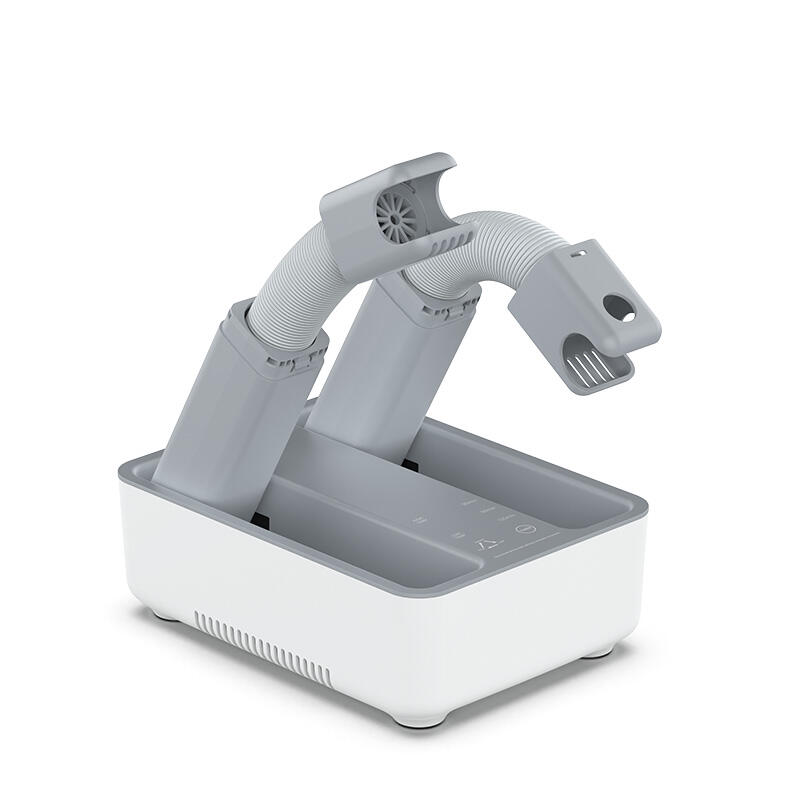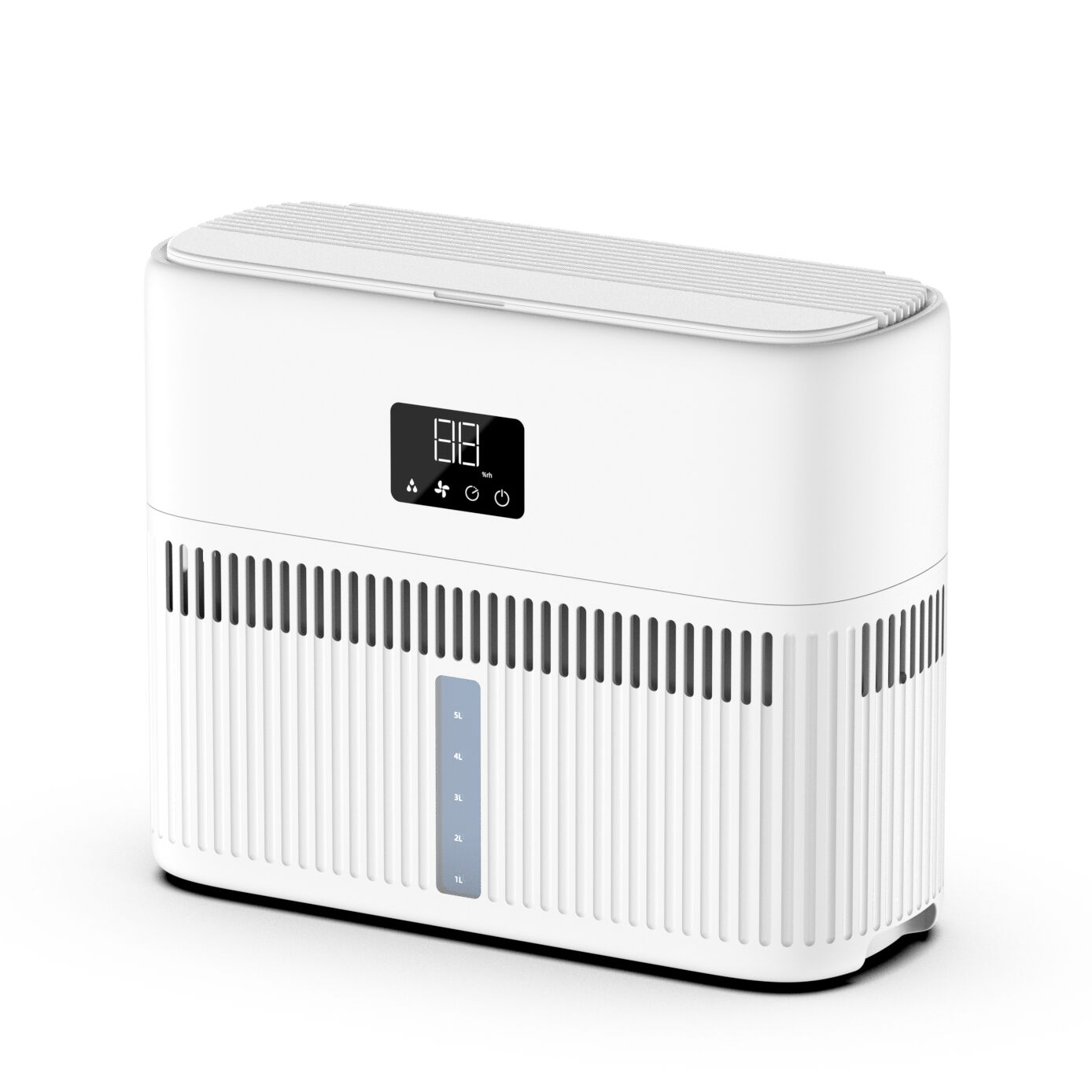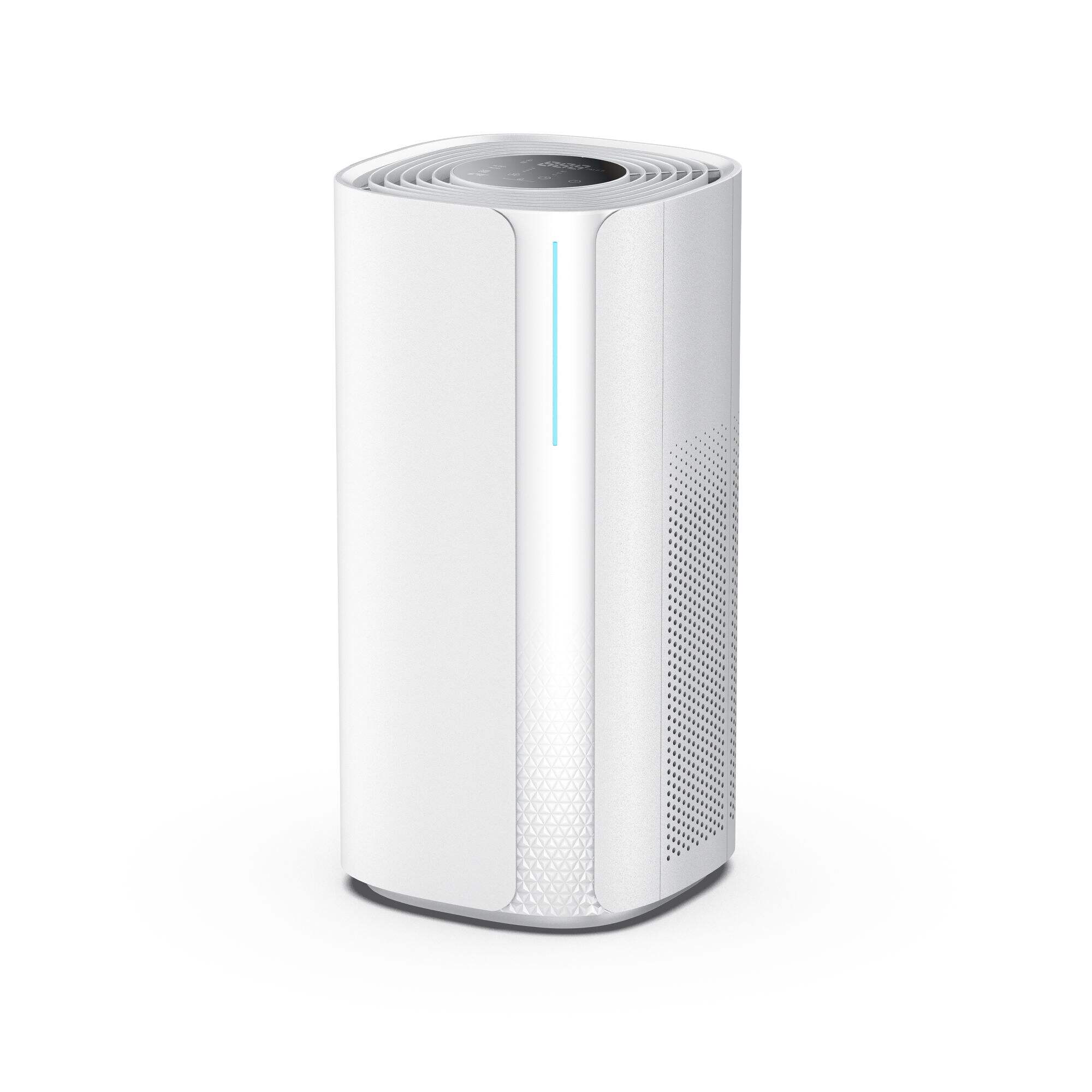Wie man einen geeigneten Luftbefeuchter für das Zuhause auswählt
Luftbefeuchter verstehen
Ein Luftbefeuchter ist ein Gerät, das durch Ausstoß von Wasserdampf den Luftfeuchtigkeitsgrad erhöht. Die Aufrechterhaltung einer angemessenen Luftfeuchtigkeit im Innenraum, insbesondere in trockenen Umgebungen, ist für die Gesundheit von entscheidender Bedeutung. Laut Gesundheitsfachleuten ist eine optimale Luftfeuchtigkeit (rund 35-50%) unerlässlich, um Atemprobleme, Hautreizungen und allgemeines Unbehagen zu vermeiden. Die Umweltbehörde betont, dass eine geringe Luftfeuchtigkeit die Atemwegskrankheit verschlimmern und die Schleimhäute trocknen kann, die unsere erste Verteidigungslinie gegen Infektionen sind.
Luftbefeuchter sind besonders nützlich in Szenarien wie Wintermonaten, trockenen Klimazonen und für Menschen mit Allergien oder Atemwegserkrankungen wie Asthma. Untersuchungen zeigen, daß Asthmatikern Erleichterung entgegenkommt, wenn die Luft ausreichend befeuchtet ist. Durch die Zugabe von Feuchtigkeit kann der Staub- und Allergenkreislauf reduziert und das Atmen komfortabler gemacht werden. Außerdem kann eine höhere Luftfeuchtigkeit die durch trockene Luft verursachten Beschwerden wie Risse an den Lippen und Juckreizen der Haut lindern.
Arten von Luftbefeuchtern
Wenn Sie die verschiedenen Arten von Luftbefeuchtern kennen, können Sie die für Ihre Bedürfnisse beste auswählen. Verdunstungsbefeuchter verwenden einen Ventilator, um Wasser zu verdunsten und Feuchtigkeit in die Luft zu dispergieren. Ein wesentlicher Vorteil dieser Geräte ist ihre Fähigkeit, die Luftfeuchtigkeit selbst zu regulieren; sie können automatisch abgeschaltet werden, sobald ein optimaler Feuchtigkeitsgehalt erreicht ist. Dies macht Verdunstungsbefeuchter ideal, um eine ausgewogene Luftfeuchtigkeit zu erhalten, ohne dass die Gefahr einer Übersättigung besteht.
Ultraschallbefeuchter bieten eine leisere und energieeffizientere Alternative. Diese Geräte nutzen Ultraschallvibrationen, um einen kühlen Nebel zu erzeugen, was sie in Räumen wie Kinderzimmern, in denen Lärmreduktion und Sicherheit Priorität haben, bevorzugt macht. Durch ihren geräuscharmen und effizienten Betrieb sind sie oft die beste Wahl für den Nachtgebrauch und sorgen für eine ruhige Schlafumgebung.
Andererseits können Dampfverdampfer, die Wasser kochen, um Dampf in die Luft zu entlassen, einen Raum schnell befeuchten, haben aber einige Vorbehalte. Trotz ihrer Wirksamkeit bei der Abtötung von Bakterien durch den Wärmeprozess verbrauchen sie mehr Energie und stellen potenzielle Sicherheitsrisiken wie Verbrennungen dar. Diese Faktoren sind besonders in Haushalten mit Kindern von wesentlicher Bedeutung, wo Sicherheit von größter Bedeutung ist.
Vorteile einer Luftbefeuchteranlage
Die Verwendung eines Luftbefeuchters bietet zahlreiche gesundheitliche Vorteile, darunter Erleichterung von trockener Haut, Irritationen der Nebenhöhlen und eine verbesserte Atemfunktion. Medizinische Studien zeigen, dass eine optimale Luftfeuchtigkeit von 30-50% die Schwere von Atemproblemen und Hauttrockenheit erheblich reduzieren kann. Experten betonen oft, dass eine angemessene Luftfeuchtigkeit für Allergiker oder Asthmatiker von Vorteil ist, da sie dazu beiträgt, die Nasenhöhle sauber zu halten und die Symptome zu minimieren. Außerdem kann eine erhöhte Luftfeuchtigkeit das Atmen erleichtern, was besonders in der Erkältungs- und Grippezeit von Vorteil ist. Wenn Sie in Ihrem Haus einen Luftbefeuchter installieren, können Sie eine bessere Gesundheit und Komfort haben.
Neben den gesundheitlichen Vorteilen spielen Luftbefeuchter eine entscheidende Rolle bei der Wartung des Hauses. Luftbefeuchter helfen, Holzmöbel nicht zu knacken, was in Umgebungen mit geringer Luftfeuchtigkeit ein häufiges Problem ist. Laut Statistiken der Branche hilft eine angemessene Luftfeuchtigkeit in den Räumen, die Unversehrtheit der Holzmaterialien zu bewahren und kostenintensive Reparaturen oder Ersatzarbeiten zu verringern. Auch in feuchten Bedingungen gedeihen Zimmerpflanzen, da trockene Luft dazu führen kann, daß Blätter welken oder braun werden. Durch die Aufrechterhaltung einer ausgewogenen Luftfeuchtigkeit schützt man nicht nur die Möbel des Hauses, sondern schafft auch eine nährende Umgebung für das Grün im Haus. Ein Luftbefeuchter ist also sowohl für die Gesundheit als auch für die Pflege des Hauses von Vorteil.
Wichtige Merkmale bei der Wahl eines Luftbefeuchters
Bei der Wahl eines Luftbefeuchters sind Größe und Kapazität entscheidende Faktoren, die die Wirksamkeit des Geräts in verschiedenen Raumgrößen bestimmen. Kleinere Einheiten eignen sich beispielsweise für Schlafzimmer oder Räume bis zu 250 Quadratmetern, während größere Modelle Flächen von 1.000 Quadratmetern oder mehr beherbergen können. Die richtige Größe sorgt für eine optimale Feuchtigkeitsverteilung und fördert Komfort und Atemgesundheit im gesamten Wohnraum.
Auch in Schlafzimmern und Büros, wo eine ruhige Umgebung unerlässlich ist, ist es wichtig, die Geräuschbelastung zu berücksichtigen. Bei Luftbefeuchtern gibt es unterschiedliche Dezibel, wobei leiseere Modelle einen Klang emittieren, der mit einem leichten Flüstern vergleichbar ist. Solche Modelle sorgen für einen ungestörten Schlaf und Konzentration, was sie ideal für den nächtlichen Einsatz und fokussierte Arbeitsumgebungen macht.
Eine einfache Reinigung ist wichtig, um die Gesundheit und Effizienz Ihres Luftbefeuchters zu erhalten. Experten sagen, regelmäßige Wartung verhindert, dass Schimmelpilze und Bakterien wachsen, was die Luftqualität beeinträchtigen kann. Suchen Sie nach Modellen mit großen Öffnungen und weniger Spalten, die den Reinigungsprozess einfacher und zeitaufwändiger machen.
Schließlich verbessern intelligente Funktionen den Benutzerkomfort moderner Luftbefeuchter erheblich. Optionen wie Fernbedienung und Feuchtemesssensoren ermöglichen es Benutzern, den gewünschten Feuchtigkeitsgrad mühelos aufrechtzuerhalten. Smart-Feuchtigkeitsbefeuchter sind oft mit Sprachassistenten und Smartphone-Apps integriert, sodass sie überall nahtlos funktionieren können. Die Wahl eines Modells mit diesen Eigenschaften kann das Luftqualitätsmanagement optimieren und sowohl Komfort als auch Kontrolle bieten.
Top-Luftbefeuchter für 2025
Die Wahl des richtigen Luftbefeuchters ist entscheidend, um eine gesunde Raumumgebung zu erhalten. Hier sind einige der Top-Pick für 2025 mit hervorragenden Funktionen und Leistung.
PTC Heizung Touch Control 3h Timer Schuhhandschuh Schuhtrockner
Dieser innovative Schuhtrockner mit PTC Heating Touch Control ist für das schnelle und effiziente Trocknen von Schuhen, Handschuhen und Stiefeln konzipiert. Es verfügt über eine einfache Bedienung mit Touch-Bedienelemente und einen 3-stündigen Timer, um sicherzustellen, dass Ihre Schuhe trocken und warm sind, wenn Sie sie brauchen. Die eingebaute PTC-Heizung sorgt für eine konstante Wärme, wodurch ein schnelles Trocknen ohne Überhitzung gewährleistet wird. Sie ist perfekt für alle, die in kalten oder feuchten Bedingungen leben, und bietet Komfort und Komfort.

Smart Sensor Großfeuchtigkeitsausgang Verdunstungsfeuchtiger
Der Smart Sensor Evaporative Humidifier zeichnet sich durch seine automatisierten Arbeiten und außergewöhnliche Luftfeuchtigkeit aus. Es ist so konzipiert, dass es größere Räume effizient befeuchtet, ohne übermäßigen Energieverbrauch zu verursachen, dank seiner fortschrittlichen Sensoren, die den Luftfeuchtigkeitsgrad regulieren. Dieses Modell ist ideal für Benutzer, die eine präzise Luftfeuchtigkeitskontrolle in großen Umgebungen wünschen, was es sowohl kostengünstig als auch umweltfreundlich macht.

Smart Air Quality Monitor für den Haushalt Großluftreiniger
Dieser Smart Air Quality Monitor für den Haushalt vereint die Funktionen eines Luftreinigers und eines Luftbefeuchters in einer schlanken Einheit. Sie sorgt für eine intelligente Ausgewogenheit der Luft und entfernt gleichzeitig Schadstoffe, wodurch sie perfekt für ein komfortables und gesundes Wohnumfeld geeignet ist. Ausgestattet mit intelligenter Technologie kann sie fern gesteuert werden, so dass Ihr Zuhause immer eine optimale Luftqualität hat.

Häufige Fehler bei der Verwendung von Luftbefeuchtern
Wenn man die Luftbefeuchter nicht regelmäßig putzt, können Schimmelpilze und Bakterien wachsen und das Gerät zu einer Gefahr für die Gesundheit werden. Die US-Umweltschutzbehörde (EPA) empfiehlt, den Luftbefeuchter während des Gebrauchs alle drei Tage zu reinigen und sicherzustellen, dass alle Komponenten, einschließlich Tank und Filter, gründlich gereinigt und getrocknet werden, um die Entwicklung von Mikroben zu verhindern. Ein gut gepflegter Luftbefeuchter trägt zu einer gesünderen Innenumgebung und zu einer längeren Lebensdauer des Geräts bei.
Durch das Verwenden von hartem Wasser in Ihrem Luftbefeuchter können sich Mineralien in dem Gerät ansammeln und möglicherweise in die Luft abgeben. Dies kann einen weißen Staub auf Oberflächen hinterlassen und bei Einatmen Risiken darstellen, insbesondere für Personen mit Atemwegserkrankungen. Studien zeigen, dass durch Luftpartikel aufgenommenen Mineralien die Lungengesundheit beeinträchtigen können. Um Risiken zu minimieren, empfiehlt es sich, in Ihrem Luftbefeuchter destilliertes oder demineraliertes Wasser zu verwenden.
Die Luftfeuchtigkeit in Ihrem Haus zu überwachen, ist wichtig, um eine Überfeuchtung zu vermeiden, die zu Gesundheits- und Hausproblemen führen kann. Niveaus über 60% können das Wachstum schädlicher Mikroorganismen wie Staubmilben und Schimmelpilze fördern, so die Gesundheitsrichtlinien. Die optimale Luftfeuchtigkeit für Komfort und Gesundheit liegt zwischen 30% und 50%. Durch die Verwendung eines Hygrometers kann sichergestellt werden, dass Ihr Zuhause diesen idealen Bereich beibehält und so sowohl die Gesundheit Ihrer Familie als auch die Integrität Ihres Hauses schützt.
Fazit: Die richtige Luftbefeuchterin für Ihr Zuhause wählen
Die Wahl des passenden Luftbefeuchters für Ihre Bedürfnisse ist entscheidend, um die Luftqualität und den Komfort im Innenraum zu verbessern. Wir haben verschiedene Faktoren wie effektive Reinigungsmethoden, Wassertypüberlegungen und Feuchtigkeitsüberwachung diskutiert, um Sie zu führen. Letztendlich besteht der Schlüssel darin, Ihre Wahl an Ihre spezifischen Anforderungen anzupassen und so ein optimales Gleichgewicht zwischen Nutzen und Funktionalität zu gewährleisten. Beurteilen Sie Ihre Umgebung, betrachten Sie die Merkmale, die Ihnen am wichtigsten sind, und investieren Sie weise in eine gesündere Atmosphäre zu Hause.

 EN
EN
 AR
AR
 NL
NL
 FR
FR
 DE
DE
 EL
EL
 HI
HI
 IT
IT
 JA
JA
 KO
KO
 PL
PL
 PT
PT
 ES
ES
 ID
ID
 VI
VI
 TH
TH
 TR
TR
 MS
MS
